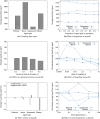Analyzing the effects of memory biases and mood disorders on social performance
- PMID: 33262387
- PMCID: PMC7708996
- DOI: 10.1038/s41598-020-77715-6
Analyzing the effects of memory biases and mood disorders on social performance
Abstract
Realistic models of decision-making and social interactions, considering the nature of memory and biases, continue to be an area of immense interest. Emotion and mood are a couple of key factors that play a major role in decisions, nature of social interactions, size of the social network, and the level of engagement. Most of the prior work in this direction focused on a single trait, behavior, or bias. However, this work builds an integrated model that considers multiple traits such as loneliness, the drive to interact, the memory, and mood biases in an agent. The agent system comprises of rational, manic, depressed, and bipolar agents. The system is modeled with an interconnected network, and the size of the personal network of each agent is based on its nature. We consider a game of iterated interactions where an agent cooperates based on its past experiences with the other agent. Through simulation, the effects of various biases and comparative performances of agent types is analyzed. Taking the performance of rational agents as the baseline, manic agents do much better, and depressed agents do much worse. The payoffs also exhibit an almost-linear relationship with the extent of mania. It is also observed that agents with stronger memory perform better than those with weaker memory. For rational agents, there is no significant difference between agents with a positive bias and those with a negative bias. Positive bias is linked with higher payoffs in manic and bipolar agents. In depressed agents, negative bias is linked with higher payoffs. In manic agents, an intermediate value of mood dependence offers the highest payoff. But the opposite is seen in depressed agents. In bipolar agents, agents with weak mood dependence perform the best.
Conflict of interest statement
The authors declare no competing interests.
Figures
References
-
- Schelling TC. Micromotives and Macrobehavior. Leicestershire: Norton; 1978.
-
- Epstein JM, Axtell R. Growing artificial societies: Social science from the bottom up. Cambridge: MIT Press; 1996.
-
- Sreenivas, N. K. & Rao, S. Egocentric bias and doubt in cognitive agents. In Proceedings of the 18th International Conference on Autonomous Agents and MultiAgent Systems, AAMAS ’19, 286–295 (International Foundation for Autonomous Agents and Multiagent Systems, 2019).
MeSH terms
LinkOut - more resources
Full Text Sources
Medical
Miscellaneous




